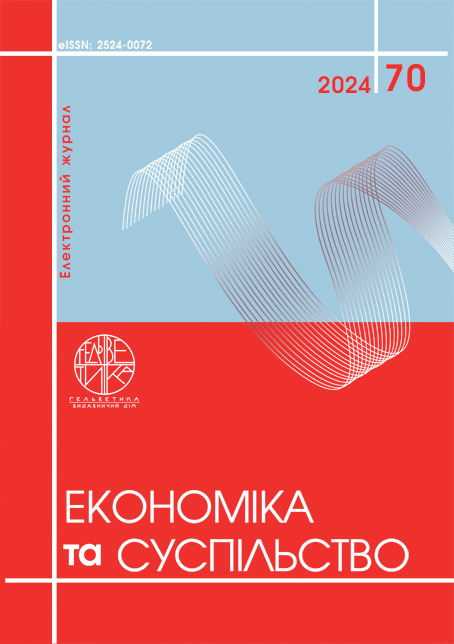PSYCHOLOGICAL ASPECTS OF HUMAN RESOURCE MANAGEMENT IN REMOTE EMPLOYMENT CONDITIONS
Abstract
The article presents comprehensive research on psychological aspects of human resource management in remote employment conditions. Based on contemporary research analysis, the theoretical and methodological foundations of studying psychological mechanisms of effective remote work are revealed through self-determination theory, social presence concept, job demands-resources model, and psychological contract theory. The transformation of the traditional psychological contract in remote work conditions is identified, characterized by changing mutual expectations between employees and organizations regarding self-organization, responsibility, technological infrastructure, and psychological support. Key psychological factors of remote work effectiveness are investigated at individual-psychological (self-regulation, stress resilience, work-life boundary management) and socio-psychological levels (virtual communication quality, team interaction, trust). Main remote work stressors are identified, including organizational (blurred work time boundaries, coordination complexity), socio-psychological (isolation, reduced cohesion), and technological (information overload, technical failures). A system of practical recommendations for psychological support of remote work is developed at three levels: organizational (forming psychological support strategy, creating infrastructure, developing corporate culture), managerial (developing virtual leadership competencies, implementing trust-based management practices), and individual (developing self-organization skills, stress resilience, and virtual communication). Special attention is paid to the specifics of the Ukrainian wartime context, requiring additional measures to ensure personnel safety, business continuity, and psychological support for employees during air raids, power outages, and forced relocation. The importance of developing organizational and personnel resilience is substantiated as a key competency for rapid recovery from stressful situations and adaptation to constant changes. Prospects for further research are identified in creating a comprehensive system of psychological support for remote work, considering both global digital transformation trends and unique challenges of the Ukrainian business environment.
References
Vasyl’yeva O., Sokolov A., Hil L. Human capital in the modern paradigm of the knowledge economy. Management and Business. 2023. Vol. 1(1). P. 22-36.
Grant C.A., Wallace L.M., Spurgeon P.C. An exploration of the psychological factors affecting remote e-worker's job effectiveness, well-being and work-life balance. Employee Relations. 2013. Vol. 35(5). P. 527-546. DOI: https://doi.org/10.1108/ER-08-2012-0059.
Garg N., Van der Walt F., Burgess J. Editorial: The psychological challenges of remote working. Frontiers in Psychology. 2023. Vol. 14. DOI: https://doi.org/10.3389/fpsyg.2023.1190064.
Sharma N. Remote work and psychological well-being: exploring the impact on employee well-being, job satisfaction, and work-life balance. International Journal of Social Science and Economic Research. 2024. Vol. 9(1). Р. 165-172. DOI: https://doi.org/10.46609/IJSSER.2024.v09i01.011.
Маляр Д. В. Дистанційна зайнятість: передумова, форма прояву та наслідок розвитку цифрової економіки. Бізнес Інформ. 2019. №10. С. 165-171. DOI: https://doi.org/10.32983/2222-4459-2019-10-165-171.
Буров О. Дистанційна робота і людський капітал: нові виклики та загрози (міжнародний досвід). Теорія і практика інтелектуальної власності. 2020. №6. С. 107-119. DOI: https://doi.org/10.33731/62020.234050.
Вонберг Т. В. Дистанційна зайнятість працівників: нові виклики та можливості. Бізнес Інформ. 2020. №4. С. 259-265. DOI: https://doi.org/10.32983/2222-4459-2020-4-259-265.
Лучик С., Лучик В. Дистанційна праця: проблеми мотивації. Acta Academiae Beregsasiensis. Economics. 2022. (1). С. 60 - 69. DOI: https://doi.org/10.58423/2786-6742/2022-1-60-69.
Бехтер, О. Вплив гібридного робочого середовища на ефективність управління персоналом. Економіка та суспільство. 2024. (65). DOI: https://doi.org/10.32782/2524-0072/2024-65-50.
Вороніна, В. Л., Горбатюк, Л. М., Зосіменко, І. А. Особливості управління персоналом в Україні в умовах війни. Міжнародний науковий журнал «Інтернаука». Серія: «Економічні науки». 2023. Т. 1, № 11(79). DOI: https://doi.org/10.25313/2520-2294-2023-11-9398.
Продіус, О., Афанасенко, М., & Лемешко , М. Напрями удосконалення системи управління персоналом в умовах воєнного стану. Економіка та суспільство. 2024. (61). DOI: https://doi.org/10.32782/2524-0072/2024-61-100.
Vasyl’yeva, O., Sokolov, A., & Hil, L. (2023). Human capital in the modern paradigm of the knowledge economy. Management and Business, 1(1), 22-36.
Grant, C.A., Wallace, L.M., Spurgeon, P.C. (2013). An exploration of the psychological factors affecting remote e-worker's job effectiveness, well-being and work-life balance. Employee Relations, 35(5), 527-546. DOI: https://doi.org/10.1108/ER-08-2012-0059.
Garg, N., Van der Walt, F., Burgess, J. (2023). Editorial: The psychological challenges of remote working. Frontiers in Psychology, (14). DOI: https://doi.org/10.3389/fpsyg.2023.1190064.
Sharma, N. (2024). Remote work and psychological well-being: exploring the impact on employee well-being, job satisfaction, and work-life balance. International Journal of Social Science and Economic Research, 9(1), 165-172. DOI: https://doi.org/10.46609/IJSSER.2024.v09i01.011/.
Maliar, D. V. (2019). Dystantsiina zainiatist: peredumova, forma proiavu ta naslidok rozvytku tsyfrovoi ekonomiky [Remote employment: prerequisite, form of manifestation and consequence of digital economy development]. Business Inform, (10), 165-171. DOI: https://doi.org/10.32983/2222-4459-2019-10-165-171. (in Ukrainian)
Burov, O. (2020). Dystantsiina robota i liudskyi kapital: novi vyklyky ta zahrozy (mizhnarodnyi dosvid) [Remote work and human capital: new challenges and threats (international experience)]. Theory and Practice of Intellectual Property, (6), 107-119. DOI: https://doi.org/10.33731/62020.234050. (in Ukrainian)
Vonberh, T. V. (2020). Dystantsiina zainiatist pratsivnykiv: novi vyklyky ta mozhlyvosti [Remote employment of workers: new challenges and opportunities]. Business Inform, (4), 259-265. DOI: https://doi.org/10.32983/2222-4459-2020-4-259-265. (in Ukrainian)
Luchyk, S., & Luchyk, V. (2022). Dystantsiina pratsia: problemy motyvatsii [Remote work: motivation problems]. Acta Academiae Beregsasiensis. Economics, (1), 60-69. DOI: https://doi.org/10.58423/2786-6742/2022-1-60-69. (in Ukrainian)
Bekhter, O. (2024). Vplyv hibrydnoho robochoho seredovyshcha na efektyvnist upravlinnia personalom [Impact of hybrid work environment on HR management effectiveness]. Economy and Society, (65). DOI: https://doi.org/10.32782/2524-0072/2024-65-50. (in Ukrainian)
Voronina, V., Horbatiuk, L., & Zosimenko, I. (2023). Osoblyvosti upravlinnia personalom v Ukraini v umovakh viiny [Features of personnel management in Ukraine during wartime]. International Scientific Journal "Internauka". Series: "Economic Sciences", 11(79)(1), 56-60. DOI: https://doi.org/10.25313/2520-2294-2023-11-9398. (in Ukrainian)
Prodius, O., Afanasenko, M., & Lemeshko, M. (2024). Napriamy udoskonalennia systemy upravlinnia personalom v umovakh voiennoho stanu [Directions for improving personnel management system under martial law]. Economy and Society, (61). DOI: https://doi.org/10.32782/2524-0072/2024-61-100. (in Ukrainian)

This work is licensed under a Creative Commons Attribution 4.0 International License.


